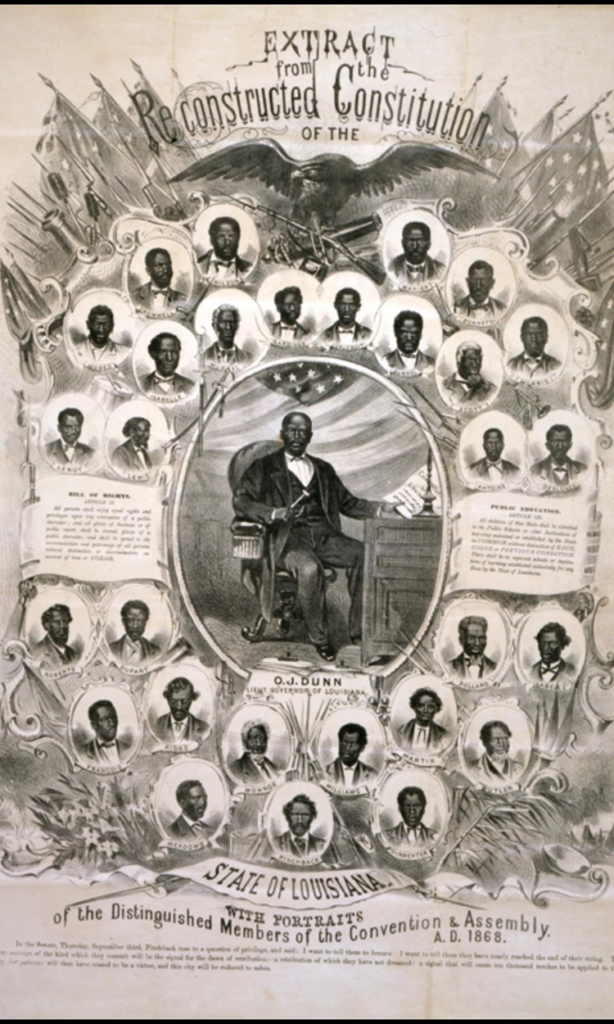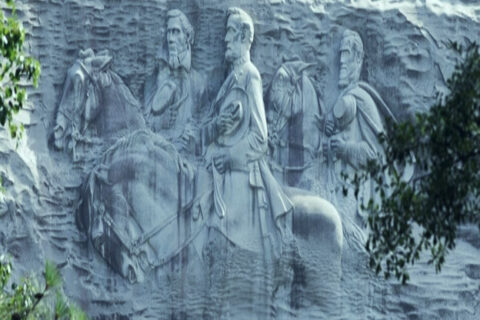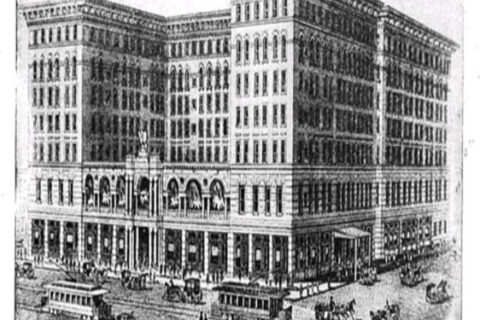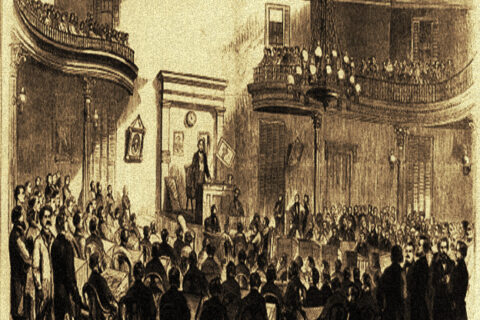One speech I shall never forget was delivered by Judge John H. Rogers. In it … he spoke as one who understood his subject, and he told the story of the struggles of the South and of its history clearly and truly, and yet without a word of hate or revenge. When he closed, a resolution was offered and adopted thanking him for the address, declaring it to be the most valuable historical document ever read before the association.
(Note to readers: Below is the concluding part – part VI of VI – of this series. As such, all six parts of “The South Vindicated,” Judge John H. Rogers’s 1903 oration at the Confederate Reunion in New Orleans, may be found archived in numerical order at my contributor pages, here. My epigraph above-posted was extracted from a reunion report, authored by Miss Bettina Ruth Bush, and published in the Marshall, MO Index newspaper shortly following her and her delegation’s return home from the reunion. Further to Miss Bush’s point in the final sentence of her above-quoted statements, the proprietor of the VETERAN later printed enough copies of the speech to send to every college that existed in the United States at that time. -TM)
“Sherman’s march to the sea, as told by himself, and Sheridan’s raid through the Valley of Virginia, as characterized by his own pen, find no counterpart in Lee’s march to Gettysburg or Antietam, or in Morgan’s raid through Ohio. No Confederate general ever recorded any boast of his cruelty to noncombatants, or felt a pride in making a Warsaw of any part of American soil. To emphasize these statements, I invoke your patience while I read an order issued by a man while in the enemy’s country, whom I believe to represent the highest type of genuine and true manhood to be found in all history:
HEADQUARTERS OF ARMY OF NORTHERN VIRGINIA, CHAMBERSBURG, PA, June 27, 1863.
The Commanding General has observed with marked satisfaction the conduct of the troops on the march, and confidently anticipates results commensurate with the high spirit they have manifested. No troops could have displayed greater fortitude or better performed the arduous marches of the past ten days. Their conduct in other respects has, with few exceptions, been in keeping with their character as soldiers, and entitled them to approbation and praise.
There have, however, been instances of forgetfulness on the part of some, that they have in keeping the yet unsullied reputation of the army, and that the duties exacted of us by civilization and Christianity are not less obligatory in the country of the enemy than our own. The Commanding General considers that no greater disgrace could befall the army, and through it the whole people, than the perpetration of the barbarous outrages upon the innocent and defenseless and the wanton destruction of private property that have marked the course of the enemy in our own country. Such proceedings not only disgrace the perpetrators and all connected with them, but are subversive of the discipline and efficiency of the army, and destructive of the ends of our present movements. It must be remembered that we make war only on armed men, and that we cannot take vengeance for the wrongs our people have suffered, without lowering ourselves in the eyes of all whose abhorrence has been excited by the atrocities of our enemy, and offending against Him to whom vengeance belongeth, without whose favor and support our efforts must all prove in vain.
The Commanding General, therefore, earnestly exhorts the troops to abstain with most scrupulous care from unnecessary or wanton injury to private property, and he enjoins upon all officers to arrest and bring to summary punishment all who shall in any way offend against the orders on the subject.
“Who could have written this order except Robert E. Lee? Years after the war had closed, at a time, it is true, when its passions had not subsided, and bitterness in the hearts of people of one section toward their countrymen in the other still lingered, in a spirit of splendid magnanimity, the victorious conqueror, the great Captain of the Union army, taught the grand lesson of forgiveness and fraternity in the imperishable words, ‘Let us have peace.’
“But this order of Gen. Lee was penned in the very midst of the furious struggle, when every heart was filled with resentment and indignation at the cruel outrages upon inno- cent and defenseless noncombatants and wanton and malicious destruction of private property, even the family portraits and heirlooms, and household effects essential to the comfort of the unprotected wives and children of the soldiers in the field.
“Contrast it with Sherman’s march to the sea and Sheridan’s raid in the Valley; with the wanton destruction by fire of the captured cities Atlanta, Columbia, Charleston; and finally with that order of that other Virginian, Hunter, by which the torch was applied even to the institutions of learning, and the building and library and apparatus, the accumulations of forty years of the Virginia Military Institute, and the library and apparatus of Washington College, endowed by the Father of His Country, perished in the angry flames; or contrast it with the conduct of Butler in New Orleans.
“In peace Grant gloriously triumphed over the passions engendered by war; but Lee, horrified by the heartless atrocities of the invading foe, in the midst of the enemy’s country, with every opportunity for revenge, triumphantly rose above all the natural instincts of the human heart for revenge, to inculcate and to practice the teachings of the Saviour of mankind, ‘Vengeance is mine, I will repay.’ Peerless, glorious Robert E. Lee! Glorious in prosperity – more glorious in adversity; glorious in victory – more glorious in defeat; resplendent in life – triumphant in death.
“What a monument is this to the character of the Southern army! One who followed Bragg through Kentucky could not have known by observation that an army had passed along the highway unless he had seen where it had camped at night, and not then because any fence had lost a rail or any orchard its fruit. Is there not something in the history of a people like that worth preserving? May no lessons here be drawn for the elevation of mankind; no memories worthy of the children of the South?
“We must not forget that a large number of the survivors of that conflict have taken up their abode in the Silent City, and those who remain are admonished that white heads are the companions of failing memories. Whatever they shall do by way of fixing the true status of the Confederate soldier must be done in the near future, for
To the past go more dead faces every year;
Everywhere the sad eyes meet us;
In the evening’s dust they greet us,
And to come to them entreat us, Every year.
May I be permitted to trespass a moment longer? It is of the Confederate soldiers in peace I would speak. I cannot – nor would I if I could – portray the ceaseless chain of wrong and oppression which followed in the wake of the great ‘Civil War,’ and it came upon a defenseless, desolated and impoverished land – a land rich in nothing but noble men and women and the precious memories of the glorious race from which they sprung and in the priceless heritage of high achievements.
If those who fell in battle could have spoken from their graves, they would scarcely have envied the fate of the survivors. Sir, if anything exceeds in constancy, in patience, in courage and fortitude, the Confederate soldier, who from 1863 to 1865, half-clad, hungry, and almost without hope of success, followed with weary but steady footsteps the tattered battle flags of the South until the star of the Confederacy went out, it was the same soldier who, for the decade that followed the war, in poverty and in want, disfranchised and despised, overrun by aliens and strangers, steadily and with a sublime constancy and devotion resisted wrong and oppression, turned his back upon place and power, while ignorance and dishonesty held high carnival, until, by the very logic of events, reason supplanted bitterness and passion, ignorance and vice gave way to intelligence and personal worth, and his long-deferred redemption came.

“Did any other people ever face and overcome adversity as did the Southern people? The same spirit which gave her armies unity, power, and endurance followed the survivors back to civil life to point the way to a new birth such as no other country has ever experienced. The South gave to her armies all of her male population, including beardless boys and gray-haired men, and they went from every walk, profession, and calling and station in life. Neither the bench, the pulpit, nor the institutions of learning were spared. All answered with alacrity and determination the call to arms.
“When it closed there were none upon whom to rely but the ex-Confederate soldier. He it was who took up the new problems which the changed conditions of his desolate land presented. Standing by the graves of his comrades, inspired by their noble deeds, chastened and disciplined by the horrors, self-denials, and sufferings of war, encouraged by the high achievements of his revolutionary sires, and loving to veneration the traditions of his ancestry, interwoven as they were with the history of his beloved South, undismayed but hampered by the prejudices and passions which war had left behind, he began the work of rebuilding her shattered fortunes and rehabilitating her dismantled commonwealths.
“But as the South had fought for the principle of local self-government and failed, so in the disjointed logic of the times she was to be denied its application in the re-establishment of her State governments. The South, yet unadjusted to its changed conditions, struggling under its burdens of misfortune and impending dangers, misjudged, misunderstood, and mistrusted, may have blundered in many things; and the great North, forgetting or ignoring the great qualities – the fidelity and honor, the genius for constructive statesmanship and good government which her fallen foe had always exhibited in war and in peace – gave rein to unrestricted passions and prejudices, alike harmful to itself and ruinous to the South.
“It sent the carpetbagger, who, aided by those who had never exercised the simplest rights of citizenship, were expected to set up and administer such governments as were fit for a people who, for nearly three-quarters of a century, had, in the main, guided and directed the splendid progress and development of the great republic.
“I would not dwell, if time permitted, upon the riotous conditions into which a helpless and defenseless people were plunged by this characterless horde of insatiable cormorants who assembled at our State capitols, to blaspheme the very name of civil government, and plot schemes to oppress a fallen foe, that they might prolong their opportunities for peculation. This is not the time nor place, but it must be left to the future historian, in the interest of truth and as a lesson to posterity, and as a warning to us all that there is no freedom where one man is permitted to govern others against their wills, to drag away the sheet that covers the rotten corpse of reconstruction. It fell, as in the nature of things it could not endure.
“Time gradually assuaged the passions of the war; commerce and business struggled under its withering influences and demanded better things; and the conscience of the great victorious North was stricken at the cruelties and follies and ruin it wrought; but a decade had passed, a weary, withering, blighting decade of misrule on the one hand, and patient endurance and long-deferred hope on the other. Again the ex-Confederate took up the burden of civil government.
“I think sometimes we forget the strong characters of those who, Moseslike, led us out of the wilderness of our woes. Few of them are now left, and their faces recede with the flying years. They were ex-Confederates, true and tried. Some yet live, and to call names would be invidious; but we owe them a double debt of gratitude, and to their memories reverence and love.
“With the South’s overwhelming problem still unsolved, she has nevertheless, under the auspices of her own people, fallen upon safe and peaceful, if not happy and prosperous, times. Her sons and daughters have resumed their rightful station, and whatever the future has in store of good for her must rest upon the traits and characteristics of her people. She will be patient; she will be prudent. To all the knightly and queenly virtues she will hold fast, trusting in God and the future for the noble and good. The South will not despair.
“I read the other day in one of Talmage’s sermons these words:
There is a flower in Siberia that blooms only in January, the severest month in that cold climate. It is a star-shaped flower, and covered with glistening specks that look like diamonds. A Russian took some of the seeds of that flower to St. Petersburg and planted them, and they grew, and on the coldest day of January they pushed back the snow and ice and burst into full bloom. They called it the snow flower; and it makes me think of those whom the world tries to freeze out and snow under, but who, in the strength of God, push through and up and out and bloom in the hardest weather of the world’s cold treatment, starred and radiant with a beauty given only to those who find life a struggle and turn it into victory.
“These sturdy, venerable veterans, bearing the scars and wounds of battle in their bitterest days, like the snow flowers of Siberia, pushed their way up and out and through all the ice and snows of the cold winters of adversity, and, thank God! they stand for all that is strong and conservative and safe in government. Will their posterity do less? Providence, as a kind Father, took by the hand our liberty-loving ancestors and guided them here. Generation after generation lived, ruled, and passed away, retaining the purity and freshness of virtuous power. Greed of gain and lust of power, culminating in plutocratic usurpation of all the branches of government, have never found favor or encouragement here. Our population, Anglo-Saxon still, has never been dominated by foreign elements ignorant and careless of the principles of our government and the practices of our fathers. We still have our splendid inheritance, except as modified – let us believe for the better – by war.
“I believe, as I live, that if our institutions are to be preserved, much – so much! – will depend upon this goodly South of ours. Our deepest concern should be for a better and more righteous national character. All the bounteous elements of earth and sky beckon us away from the base fascination of pelf which dishonors and destroys our country. Let us invite all her people into paths of law and order, inculcating peace, and keep alive our sense of justice and human freedom, and let all our advancement and growth be characterized by such a recognition of the rights of man as shall make her people feel that the blessings of Providence are theirs under a government of just and equal laws.
“May our beloved Southland build all her temples, not upon the shifting quicksands of selfish expediency, but upon the everlasting principles of right! Let us not forget that, in the great armory of Divine Providence, Justice forges her weapons long before her battles are fought; that in the everlasting courts of heaven every man must suffer the penalties of his disobedience, and all nations the penalty of injustice and wrong.
“Whatever may be our burdens or calamities, let us bear them with that courage and fortitude that becomes a just and a great people; and may our children and our children’s children be inspired to walk along the very mountain ranges of an enlightened Christian civilization, always in the path of duty, and preserve and keep sacred the same great qualities that made their ancestry respected and beloved of mankind!
***End of speech***







Thank you Mr. Morris, for telling me about that most Noble man, Judge John H. Rogers.
God Bless you always Sir.